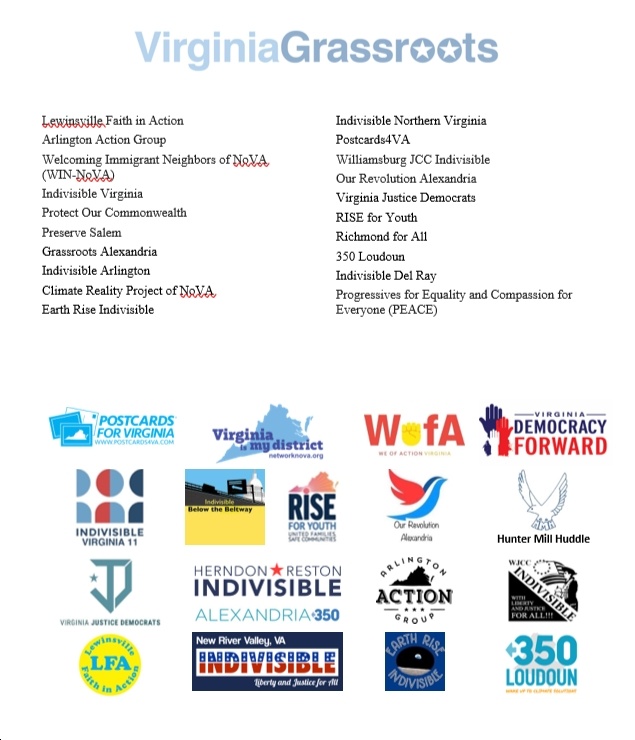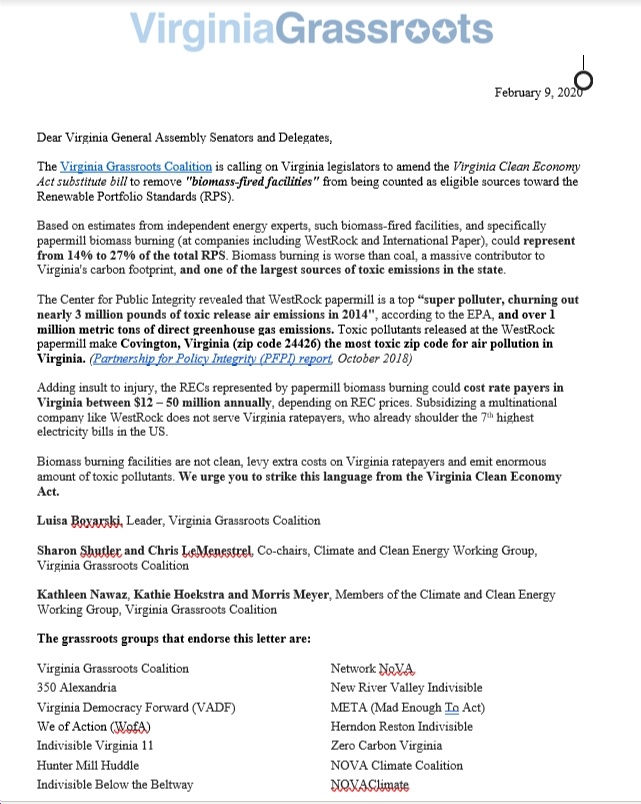The following letter is from the Virginia Grassroots Coalition, with over 40 participating groups. I’m not sure if the RPS percentages are exactly accurate, as I’ve heard conflicting takes on that one, but having said that – and while I’m certainly open to *advanced* biofuels such as switchgrass, algae, and hemp – I’m certainly not a fan of growing trees to burn for electricity. As this paper explains:
- “Though touted as a clean, environmentally safe alternative to fossil fuels, wood pellets are a carbon-intense, destructive and polluting industry based in flawed carbon accounting in international agreements.”
- Wood pellet material sourcing leads to massive deforestation of critical habitats, and Enviva alone is responsible for 50 acres a day of clear-cut land. Pellet production facilities release dangerous air pollutants including particulate matter and volatile organic compounds putting surrounding communities at higher risk for health complications.”
- “Finally, burning wood pellets releases 65% more CO2 than coal per megawatt hour. In order to keep global climate change below 1.5 degrees Celsius, wood pellets must not be used as an energy alternative.”
Also see this BBC news story, entitled “Most wood energy schemes are a ‘disaster’ for climate change.” And check out this Energy News Network piece, “Wood pellets cause more climate pollution than coal when they’re burned. So why does Europe call them ‘carbon neutral’?” Also, see this story in The Guardian, which explains:
UK-based researchers found last year that burning wood is a “disaster” for climate change because older trees release large amounts of carbon when they are burned and aren’t always replaced with replanted forests. Even when trees are replaced, it can take up to 100 years to cultivate a wooded area that soaks up as much carbon as was previously released. And the fuel burned in shipping wood pellets to Europe is also a significant source of emissions.
So…nope, burning trees to produce electricity is not an idea we should be encouraging here in Virginia. We also shouldn’t be encouraging “black liquor” to count as “renewable” energy. For more on that topic, see this article by Ivy Main, which explains that one industry in Virginia has “stood out for the nastiness of its emissions: paper mills.” Why? Because “Burning [black liquor – a waste product of the pulping process] produces sulfur oxides, nitrogen oxides, particulate matter, arsenic and lead, and as much carbon pollution as coal.” And, as Main wrote:
Those pollutants are part of the reason that paper manufacturing giant WestRock remains the single largest privately owned emitter of toxic air pollution in Virginia, according to EPA data. WestRock owns three paper mills in Virginia that produce black liquor renewable energy credits for the Maryland market, as well as paper products for the rest of the world. Its mill in Covington, Va., was the No. 1 emitter of toxic air pollutants in Virginia in 2015, besting even the state’s largest coal plants.
Again…no, thank you to this stuff. And certainly, there’s zero justification for counting this as “renewable energy” in Virginia’s Renewable Portfolio Standard. So…yeah, remove “biomass-fired facilities” from the Virginia Clean Economy Act. Instead, let’s move towards *real* clean energy – solar, wind, energy efficiency, geothermal, etc. – as rapidly as possible.




![Sunday News: “Trump Is Briefed on Options for Striking Iran as Protests Continue”; “Trump and Vance Are Fanning the Flames. Again”; “Shooting death of [Renee Good] matters to all of us”; “Fascism or freedom? The choice is yours”](https://bluevirginia.us/wp-content/uploads/2026/01/montage011126.jpg)

![VA DEQ: “pollution from data centers currently makes up a very small but growing percentage of the [NoVA] region’s most harmful air emissions, including CO, NOx and PM2.5”](https://bluevirginia.us/wp-content/uploads/2026/01/noxdatacenters.jpg)
![New Year’s Day 2026 News: Full Video of Jack Smith Testimony – “The attack that happened at the Capitol…does not happen without [Trump]”; Trump/RFK Jr Make Measles Great Again; Right-Wing YouTuber Nick Shirley Definitely Not a Real Journalist; Musk Did Enormous Damage in 2025](https://bluevirginia.us/wp-content/uploads/2026/01/montage010126.jpg)












